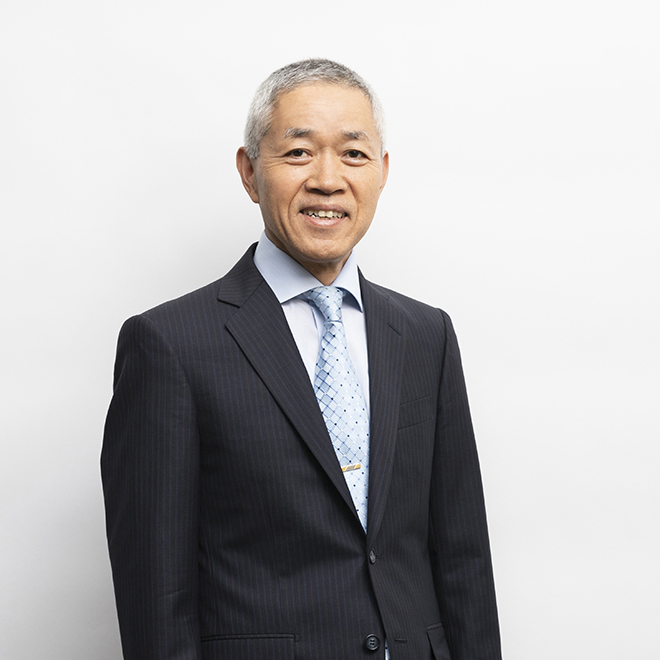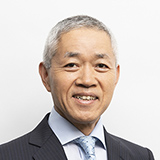

Lately, global-level issues and the UN’s 17 Sustainable Development Goals (SDGs) that indicate the goals for solving these issues have been drawing more attention. At Anderson Mōri & Tomotsune, we as legal professionals continue to look for ways to contribute to achieving these SDGs. Our lawyers have developed a wealth of SDG-related expertise in their respective fields and have put these resources at the disposal of our clients, helping them find best practice-based solutions to the many legal issues that attach to sustainable development.
In this special feature, we introduce some of the activities that have allowed our lawyers not only to commit our Firm to the UN’s SDGs, but also to position our Firm as a leader in the field of sustainability law.
For this second dialogue in this feature series, we conduct an interview with Junji Nakagawa, Professor Emeritus at Tokyo University (Research fields: international law; international economic law). Professor Nakagawa also acts Of Counsel at our firm.
*Date of the interview: February 10, 2022, conducted online.
Feature #2: Thinking Through the Subject of Business and Human Rights
(Interview with Junji Nakagawa, Professor Emeritus at Tokyo University and Of Counsel at AMT, conducted by Shigeki Tatsuno, Partner at AMT)
Table of contents
Q1:The circumstances of why human rights issues have been attracting greater attention in recent years
TatsunoWe previously hosted a discussion on the significance of, and recent trends in, SDGs. The topic for this second dialogue is “Business and Human Rights”, and to help us understand more about this subject, a topic of increasing interest for practitioners of business law, we now turn to Junji Nakagawa, a specialist in international economic law.
Most of us usually think that the way we look at human rights in business has remained static, but it has not. Why is this topic being increasingly addressed in recent years?
NakagawaTo begin with, traditionally, guaranteeing human rights has been the duty of the State. The Constitution of Japan states that the State has a duty to guarantee human rights. The International Bill of Human Rights also stipulates that the Nation State has a duty to guarantee human rights.
However, over the past 20 years, society has come to look more closely at the adverse impact on human rights created by corporate activities. When NGOs (Non-government Organizations) that monitor the abuse of human rights by global companies report on such incidents, this spreads instantly throughout the world on social networking services. The impugned company is then exposed to serious risks such as boycotts, falling stock prices, or loss of business partners. In 1997, Nike faced a boycott when it was discovered that child labor was being used by Nike’s outsourced manufacturers in Indonesia and Vietnam. Similar incidents have also been discovered occasionally thereafter. Under such conditions companies can no longer ignore the issue of human rights.
As part of this international trend, the “Guiding Principles on Business and Human Rights” (“Guiding Principles”) was resolved by the United Nations Human Rights Council in 2011. These Guiding Principles indicate that companies should conduct an internal human rights due diligence (“Human Rights DD”) (Principle 17). There are accelerating movements, particularly in Europe, to establish the mandatory performance of a Human Rights DDs in national domestic law and Japanese companies can no longer ignore these trends.

Q2:Guiding Principles of business and human rights
TatsunoIn the field of corporate law, the concept that “a company belongs to its shareholders,” i.e., the traditional dogma of shareholder capitalism, has been until now a given. However, in recent years, a different approach, namely, that “a company is a social entity the existence of which is inextricably linked to the existence of its stakeholders” is gradually spreading.
NakagawaIn particular the “S” (Social) of “CSR” (“Corporate Social Responsibility”) implies a respect of human rights. Presently, the international practice that holds companies accountable to human rights is gradually spreading in the form of non-legally binding “soft law”. In addition, a “hard law” movement stemming from Europe and that reaffirms a company’s responsibility to respect human rights is also gradually spreading.
TatsunoDo you think that the establishment of the Guiding Principles will give a boost to this movement?
NakagawaYes, the resolution of the Guiding Principles is a turning point. To briefly give the background on how the Guiding Principles were resolved, from around 1970, the United Nations attempted to control the activities of companies of the so-called developed countries by establishing a Code of Conduct for multinational companies. However, this attempt failed due to opposition from the developed countries.
In 2000, the United Nations launched the United Nations Global Compact. The Global Compact articulated ten principles, including such as related to human rights, labor, environment, and anti-corruption, during Secretary-General Annan’s regime. This movement is still continuing.
Professor Gerard Ruggie of Harvard Business School supported this Global Compact movement. In 2005, Professor Ruggie was appointed as the UN Secretary-General’s Special Representative for “Human Rights and Multinational Companies.”
In 2008, Special Representative Ruggie presented the paper, “Protect, Respect and Remedy: a Framework for Business and Human Rights.” In June 2011, the United Nations Human Rights Council endorsed the above-mentioned Guiding Principles as an outline for implementing this framework. The Guiding Principles indicate in a fair amount of detail that companies must take on the responsibility of respecting human rights.
Q3:Trends in emphasizing Human Rights DDs
TatsunoThe Guiding Principles also detail a company’s responsibility to respect human rights, to conduct a Human Rights DD, and describes a remediation, or reparations, processes. The Guiding Principles emphasize expressly and in detail the nature of a Human Rights DD in five sections, from Principle 17 to Principle 21.
NakagawaI think the Human Rights DD, Principle 17, is the core of the Guiding Principles. To describe a Human Rights DD briefly, this is a series of processes undertaken to assess the adverse impact of corporate activities on human rights, and to formulate and execute appropriate responses. While due diligence in the field of M&A law which we often hear about means a separate due diligence process for a given transaction, a Human Rights DD is an ongoing process that must be continuously implemented.
In this regard, the constituent elements that underlie a Human Rights DD are indicated at Principles 18 to 21. Principle 18 indicates that companies should identify and assess any actual or potential adverse impacts on human rights; Principle 19 indicates that companies should take appropriate actions based on the findings revealed by the impact assessment; Principle 20 indicates that companies should track whether their actions taken in response to adverse impacts from their corporate activities were effective; and Principle 21 indicates that companies should publicize externally the results of all of these processes. These processes mean that companies must implement a sequential PDCA (“plan-do-check-act”) cycle to protect human rights when conducting their corporate activities.
TatsunoThe Guiding Principles themselves are soft law, but over the past ten years, since 2011, the trend has been changing with a view to establishing these principles as “hard law” domestically, mainly in Europe and the U.S. Why is it that Europe and the U.S., and in particular Europe, are quicker to act on human rights?
NakagawaEurope, which has learned from its historical civil revolutions, is the birthplace of the concept of human rights, and is today home to many human rights NGOs. Europe today has a cultural and social preference for respecting human rights. The EU member states are especially actively promoting domestic legislation of a Human Rights DD requirement based on the so-called new EU directive (Proposal for a Directive on Corporate Sustainability Due Diligence ). This movement involves elements of industrial policy. In other words, by raising the standards of respect for human rights in the European markets, the aim is to level the playing field by imposing high hurdles on companies from both EU-member and non-member states, and to eventually make the standards of respect for human rights in the EU a global standard. This ability of the EU to create European standards and then have them adopted as global standards does not only apply to human rights, incidentally, but also to other regulatory domains.

Q4:Trends in Japan concerning human rights
TatsunoFrom the perspective of industrial competition, there seems to be a determination to establish a Human Rights DD requirement into “hard law”. How is the Japanese government reacting to this movement?
NakagawaThe Japanese government has just begun to seriously address this issue. In Japan, in October 2020, “National Action Plan on Business and Human Rights” (“NAP”) was formulated. NAP states that companies are expected to promote the introduction of a Human Rights DD in their corporate activities and seeks to inform Japanese companies of the movement towards introducing Human Rights DDs. In other words, the Japanese government now notifies companies of the importance of Human Rights DDs and encourages them to implement a Human Rights DD, but does not make this a legally binding obligation. The Japanese government has probably assumed that Japanese companies cannot act immediately on this issue since Human Rights DDs can require a burdensome process, and has decided that it would be inappropriate at this stage to go as far as to make this an obligation. I have heard, however, that the Japanese government will establish guidelines on Human Rights DDs probably by the summer of 2022.
As respect for human rights is becoming a global standard, especially in Europe, we should pay close attention to how Japanese companies will react in accordance with the NAP.
TatsunoIn December 2021, the Japan Business Federation (Keidanren) revised “Chapter 4: Respect for Human Rights” of the “Implementation Guidance on the Charter of Corporate Behavior”, and published the “Handbook for Management that Respects Human Rights.” However, the revised handbook has not become a binding rule due to various dissenting opinions. How would you evaluate the progress being made in Japan?
NakagawaTo be honest, Japan’s efforts still cannot be given high marks at present, but it is true that efforts are being made to address Human Rights DDs even in Japan.
In November 2021, the Ministry of Economy, Trade and Industry and the Ministry of Foreign Affairs released the results of a survey entitled, “Questionnaire Survey on the Status of Efforts on Human Rights in the Supply Chains of Japanese Companies,” a survey of 2,786 listed companies, of which 760 companies responded. 70% of the respondents said that they had established policies to protect human rights, and more than 50% of the responding companies said they were implementing Human Rights DDs. In addition, 70% of respondents said they refer to the Guiding Principles when formulating their human rights protection policies. In other words, about half of the companies that responded to the survey in Japan are working to protect human rights in line with the United Nations’ Guiding Principles.
Companies with large sales and a high percentage of overseas activities are more committed to protecting human rights. Human Rights DDs are an issue that must be absolutely addressed, especially for companies that seek to conduct business in Europe. Global companies are now forced to become sensitive to supply chains and to proactively address Human Rights DDs. However, since this is for now a movement of large companies that are expanding their business globally, I think that small to medium-sized companies still have a long way to go to address this.
TatsunoJapanese companies have a big challenge ahead of them.
NakagawaThe United Nations’ Guiding Principles are the global standard, and it is anticipated that the movement to turn these principles into “hard law” will further spread throughout the world. In Asia, Thailand announced an action plan based on the Guiding Principles in 2019. In the future, even as Japanese companies expand into emerging countries, they must be very focused on the protection of human rights.
As I mentioned earlier, the issue of human rights protection is a matter of great concern to civil society, and NGOs are always on the lookout for human rights abuses. Human rights abuses are like a contagion that spread so quickly that we cannot neglect to deal with them as soon as we become aware of them. Companies should consider the protection of human rights as an investment in their long-term global business activities and should treat human rights challenges as a top-level management issue. Furthermore, when companies address the protection of human rights, they should not only react to human rights abuses in order to avoid the risk of a negative backlash, they should focus on the positive effects that their efforts will bring about, such as earning the esteem of their business partners and investors, as well as become attractive recruiting and hiring destinations.
TatsunoI understand that the protection of human rights has become one of the new important management issues for businesses. Thank you very much for your time today.


